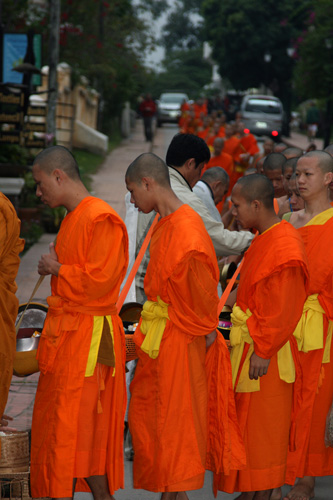
When a person dies, close relatives usually spend a certain period of time in mourning. The length of the mourning period depends upon the tie, which existed between the deceased and members of the bereaved family. During this time they dress in a certain way, abstain from most forms of merrymaking and entertainment. Some people wear white, others black and some do not attend weddings or other celebrations until a year has passed and so on. These are not specifically “Buddhist” observances because the Buddhist scriptures do not refer to them as such.
However, different communities have developed certain rites based on their own cultural practices and these have come to be accepted as being “Buddhist.” Their intention is to honor the memory of a departed one, to remind one of his own mortality and so develop of greater sense of spiritual awareness. If intelligently followed, and if these practices do not interfere with the necessary process of living, then as Buddhists we have no reason to object to them. The Buddhist Way is the Middle Way, the Path of Moderation in All Things.
Post-Funeral Rites and Memorial Services
Then there are questions about post-funeral rites. Some people hold prayer services for the deceased on the seventh day, forty-ninth days and on the one hundredth day while others, besides the seventh day, do it after three months and one year. Some people do believe that the spirit of the dead would return during these specific times. But whether or not we believe in this is not important. A sensible religious service in memory of the dead where friends and relatives gather to share a spiritual experience and to give moral support to reduce the grief of the bereaved family is ennobling. But there is no necessity to insist that the service must be held on a specific date. Any date convenient to all concerned should be acceptable for the performance of the service.
CHENG BENG or ALL SOULS’ day is not a Buddhistic term or practice. But it is certainly a good gesture when a whole community sets aside a special day to remember their departed ones by collectively cleaning the cemetery, and offering flowers as a mark of respect. This would indicate that the deceased’s descendants are filial and have fulfilled their obligations to their forbears. Buddhism does not object in anyway to this excellent exercise in gratitude and remembrance enabling the young to show respect for their elders and to emulate a good traditional practice of honoring the spirits of departed ancestors. However, the fear that some people create in the minds of innocent people that the departed will return to torment or disturb the family members if they do not perform certain rituals in groundless.
Alms Giving

It is a common practice in most communities to conduct religious services for the dead during the prescribed periods following the funeral. The Buddhist practice is to partake in almsgiving and to transfer merits to the departed. To do this relatives and friends of the deceased usually invite a number of monks and offer them requisites such as food and medicine. These offerings which contribute to the material welfare of holy people are considered to be an act of merit. Understanding Buddhists also extend their donations to charitable institutions, needy persons, and religious building projects as well as to publish free religious booklets and literature for distribution to the public to perpetuate the memory of the departed ones. The devotees who give the offerings do so with pure hearts and develop a wholesome state of mind. They do these good deeds in memory of the dead person, and develop wholesome mental links with the dead person. If the departed one is in a favorable position to receive these mental radiations (transference of merits) he will be greatly benefited. If on the other hand he is not in such a position, then the good deeds are not wasted because they will help the living persons who generated such good thoughts to reach a higher level of spiritual well being. Buddhist monks in any temple will gladly assist members of the bereaved family with regard to what needs to be done to conduct such an almsgiving service.
It is fervently hoped that our local Buddhist leaders would take due cognizance of some of the foregoing prevalent practices which are negative in character and other prejudices with a view to causing reform to be effected so that whatever practices that are being carried out by us would be more meaningful. It is felt that our leaders should conduct a basic reappraisal of current practices and recognize the urgent need to bring about such reform through public education and the widest possible publicity be directed towards this end.
- This is based on “Buddhism For The Future, “by Dr. K. Sri Dhammananda.
